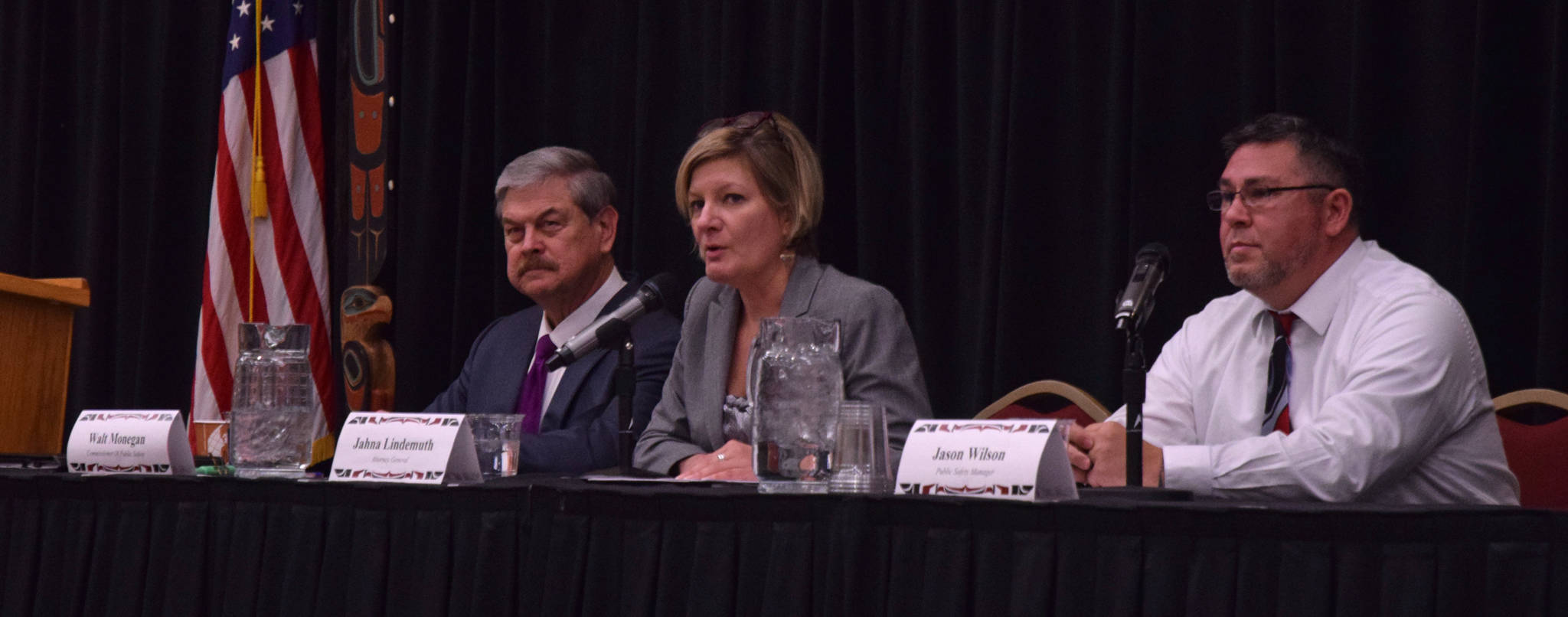The head of Southeast Alaska’s Village Public Safety Officer program said Thursday that he believes a public safety plan proposed by Gov. Bill Walker is “a good start” to addressing a critical shortage of law-enforcement officers in rural Alaska.
Jason Wilson, head of public safety for the Central Council Tlingit and Haida Indian Tribes of Alaska, made that comment after a lunchtime discussion of the plan by Attorney General Jahna Lindemuth and Public Safety Commissioner Walt Monegan. Lindemuth and Monegan were the guests of the inaugural Native Issues Forum of 2018. Tlingit and Haida hosts the forums on a regular basis during each legislative session.
“This is part of our ongoing effort, talking about it with you,” Lindemuth told the audience of more than 120 people who attended the talk.
In October, Gov. Bill Walker unveiled a “public safety action plan” that now contains 68 separate actions. Some have already been done, Lindemuth and Monegan said, but others have been added in their place.
Some elements of the plan call for additional funding to be approved by the Legislature, but those requests are on the small side because the state still faces a $2.5 billion budget deficit.
Critically for Southeast Alaska beyond Juneau, the plan identifies steps to help “rural justice.”
In Kake, the call for additional police help has been particularly vocal. Nineteen-year-old Jade Williams was killed in a suspicious incident there in August, but no arrests have been made or suspects identified.
By email, former Kake Police Chief Joel Jackson asked Monegan and Lindemuth, “Why, after all this time, have we had no more response to our problems?”
Kake dissolved its one-person police department years ago for lack of funding, and bad weather can keep troopers away.
“We need to have a greater presence,” Lindemuth said in agreement.
Monegan also agreed, but said, “We are having a tough time.”
Ten percent of trooper positions are vacant, and one-third of the Village Public Safety Officer positions in the state are unfilled. The VPSO program was created as a joint tribal-state effort to provide police protection in places where troopers are unavailable, but according to statistics presented by Monegan, 27 of the 78 VPSO jobs are vacant.
Wilson said it’s challenging to recruit for those jobs: People are asked to police their friends, neighbors, and even family members. They’re frequently without backup.
Since the 2014 police-involved shooting of Michael Brown in Ferguson, Missouri — a shooting captured on cellphone video and widely shared — he said he’s seen fewer people interested in becoming law enforcement officers. Police departments have had to raise salaries and headhunt from other departments. That issue has trickled down into Southeast Alaska, where the Juneau Police Department also has a significant number of vacant positions.
Walker has relaxed rules on how VPSO funding may be used, and the state has asked for additional funding for troopers’ rural travel. The action plan also calls for moves to reduce the number of vacant trooper positions and better coordinate transportation and logistics in rural areas. According to information presented at Thursday’s forum, the state is trying to eliminate red tape that prevents troopers from using other departments’ aircraft and vehicles.
Monegan said if people are concerned about the problem, they should encourage Alaskans to consider joining the troopers or becoming a VPSO.
“The best VPSOs are Alaskans,” he said. “I am asking each and every one of you to help.”
• Contact reporter James Brooks at james.k.brooks@juneauempire.com or call 523-2258.

